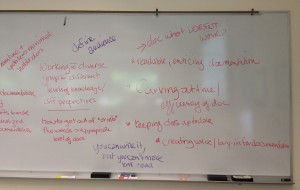Digital Curation Services at Code4Lib NYS 2016
Code4Lib NYS 2016 Unconference was held at Cornell’s Mann Library, Thursday & Friday, August 4-5, 2016. The Digital Curation Services team (Mira Basara, Dianne Deitrich, and Michelle Paolillo) attended both days, and found many opportunities to sharpen our skills in the service of digital curation, as well as opportunities to network with colleagues beyond Cornell. The three of us had different interests in attending the unconference, as noted below. Our varied perspectives reflect the nature of digital preservation itself: how it is integrated with the many other activities of the digital life cycle, and the broad range of skills that come into play in the service of long-term assurance for our digital assets.
Mira: I was very impressed with the number and quality of workshops and sessions offered on Code4Lib. I attended two mornings of a workshop called “Command Line Interface Basics” led by Francis Kayiwa (Virginia Tech). The workshop covered the user and programming interface of the UNIX Operating System. Even though I have been using UNIX Shell for years my knowledge was spotty and this workshop really filled gaps that I have been missing, such as different ways to edit files or filter files, and communication and file archiving. Another interesting session was Introduction to Hydra, which again provided a great insight into ActiveFedora based model. I feel this will give me better insight of the overall system. Having a basic understanding of the model will help me if my work leads me to use or administer Hydra-based systems.
Dianne: When I saw a hands-on Fedora 4 workshop advertised on the Code4Lib schedule, I knew I had to be there. I’m the sort of person who learns best by diving right into using a particular system. The Fedora repository software has always seemed a bit mysterious to me; I’ve pulled content from a Fedora 3 repository through my past work with electronic theses and dissertations, but beyond that, I wasn’t really sure of its inner workings. Our instructors, Esmé Cowles (Princeton University) and Andrew Woods (Duraspace), were great — and in addition to providing a high-level overview of Fedora, they provided an introduction to the world of resource modeling, access control, and Apache Camel integration. I was really impressed by how accessible they made the content, and how often they checked in with us to make sure that nobody was lost or too far behind. While I might not be working with Fedora repositories directly, these workshops provided some invaluable context that I can use to understand our own repository infrastructure.
Michelle: I was happy to spend much of the conference in the Write-The-Docs inspired workshop sharpening my documentation skills. Cristina Harlow (Cornell) and Gillian Byrne (Ryerson) led us in a well-designed experience through both morning sessions. Together we explored possible structures of documentation, and defined the elements that are necessarily included in complete documentation. Then we shifted to examples of documentation in an open critique. We shared examples of documentation we had all run across, explaining what we liked, or did not like, and possible ways to improve them. After this we had opportunity to work on improving our own documentation. I worked on making some templates in the CULAR wiki, such that when we add new collections, the template already has prompts for the information that should be captured. We are encouraged to share our documentation and templates back to the Write-the-Docs community. Over all, I feel this session has helped me streamline the process of documentation, and to clarify my focus as I write.
The keynotes themselves were powerful reminders that our efforts exist in a context of humanity and ethics. Patricia Hswe’s address served as a reminder that sound relationships among project and service teams are just as important to the project or service success as the technology components (and fundamentally so). She reminded us that the emotional labor of listening to and acknowledging the needs of stakeholders is important for building successful systems; the degree to which we can become comfortable with uncertainty is the same degree to which we can influence the outcomes of our projects for the better. Tara Robertson challenged us to consider a broader range of ethical questions when making content available. We are all familiar with the notion that the ease of making content available digitally may deceive us as to the legality for doing so. But even when legal right is assured, harm can come to communities if we insist on our right to provide unfettered access, especially to minority communities that may be missing from the conversation that informs any such decision. Through several examples, she challenged us to transform our profession; to ask not only whether we had legal rights to provide access, but to engage in the ethical question of who we might harm by exercising these rights. These two keynotes were reminders of the reach of the impact as we preserve content and make it available; our mindfulness in this realm can help steer us towards better waters as we navigate the digital age.
We are indebted to Christina Harlow for a well-organized, engaging conference that was so conveniently located. She will say that she had a lot of volunteer help; doubtless this is true, but it is also true that the success of this conference is largely due to her initiative and follow-through. This conference provided us with a conveniently located context to sharpen our skills and add tools to our “digital curation toolbox”. Many thanks!

